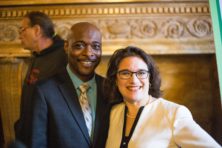Greta Thunberg Isn’t Just an Activist – She’s a Role Model
- Share
- Tweet
- Pin
- Share
Solomon Lindenberg is a senior at Gibraltar High School and editor of the school newspaper, the Viking Voice.
There’s more carbon dioxide in our atmosphere now than at any time in human history. Earth has experienced the 20 warmest years on record during the past 22 years. Average wildlife populations have dropped by 60 percent in a little more than 40 years.
Yet who is the loudest voice speaking out today? A 16-year-old Swedish activist named Greta Thunberg. And the only way action will be taken against the threats to our environment is if we begin to have the same intense and zealous mentality as Thunberg.
Greta Thunberg first became known for her activism in 2018 when she spent school days protesting the Swedish parliament for not taking more action against climate change. Since then, she’s risen to worldwide fame as an activist. Not only has she made a name for herself, but she’s also inspired many other youth climate activists – and it’s not just because she’s more interesting, accessible and relatable to youth than Al Gore was.
A large reason for her influence on people is the context of her age. At just 16, she speaks with a moral urgency that is similar to that of Gandhi and Mandela. In contrast to many other climate speakers and activists, she speaks in words that are straightforward, easy to understand, and blunt. Fundamentally, she’s easy to listen to. Her speeches are less fact- and data-based than they are flat-out emotional. In a largely uneducated world, facts and statistics have proven ineffective in spurring people to action.
“You are failing us,” Thunberg has said. “But the young people are starting to understand your betrayal. The eyes of all future generations are upon you. And if you choose to fail us, I say, we will never forgive you.” Thunberg says it with utter resentment. She uses the pronoun “you” as a weapon, aiming to make listeners realize their responsibility to act.
Few have framed global climate change as a more personal issue than Thunberg has. She’s passionate, uses an authoritative tone and makes people uncomfortable. She views imminent environmental threats as if an intruder is standing outside her door with a weapon, threatening her and her family, and she needs the help of everyone in the world to stop this threat.
In contrast, others seemingly view environmental threats as if someone were to say, “There might be someone out to get you, but if so, he’s hundreds of miles away.” It makes you feel a bit unsteady, but it’s nothing that’s going to make you change your lifestyle. You feel as though someone else will protect you from this threat, so you don’t have to protect yourself.
The question of why we aren’t taking action – and Thunberg is – can be easily explained by psychological processes. According to Sigmund Freud, our brains use unconscious defense mechanisms to protect us from difficult and uncomfortable situations by warding off unpleasant and anxious feelings. Psychology Today says that some of the defense mechanisms that apply to society’s perception of climate change include denial, rationalization and diffusion of responsibility.
Roughly 20 percent of Americans are “climate-change deniers” who openly deny scientific evidence of the human contribution to climate change and believe it’s a hoax. Others try to rationalize the situation by saying things such as, “If it were a real problem, someone would have done something about it by now” or “If it were a crisis, why do so many people deny its existence?” Only four in 10 Americans, according to a Washington Post poll taken in September, believe it’s an urgent crisis.
Many push their responsibility for environmental advocacy onto others by saying things such as, “If other countries aren’t taking action, why would we?”
Thunberg is significant in all of this because the last thing she’s willing to do is use these psychological defense mechanisms. Thunberg has Asperger syndrome, a condition that she refers to as a “superpower” because it allows her to be more direct and straightforward about climate change.
The reason why climate change continues to become an even more dangerous and impending threat everyday is largely our attitudes and dispositions toward it. Even in her youth, Greta Thunberg should be a role model for adults because of her passionate and emotional approach to dealing with environmental crises. If environmental change is to come, we all need to act as advocates, just as Thunberg does.
“We need a balance of optimism and outrage,” she said. “We need optimism to keep going and to not give up … and we need outrage to be able to step outside our comfort zones.”
Thunberg’s talking points are reflective of the views of many of us in the generations that will have to live with what’s left of this planet. The average age of our 115th Congress is the highest of any Congress in recent U.S. history. Most of its members won’t live to experience any of the most catastrophic effects of climate change, so what’s it to them?
But they represent us young people, too. The refusal to act as a nation isn’t just because of the corruption in politics that we’ve had for centuries. It’s worse: it’s personal, selfish and dire. The World Health Organization has “conservatively” predicted that climate change will result in 250,000 annual deaths between 2030 and 2050, totaling 1 million fatalities per presidential term.

